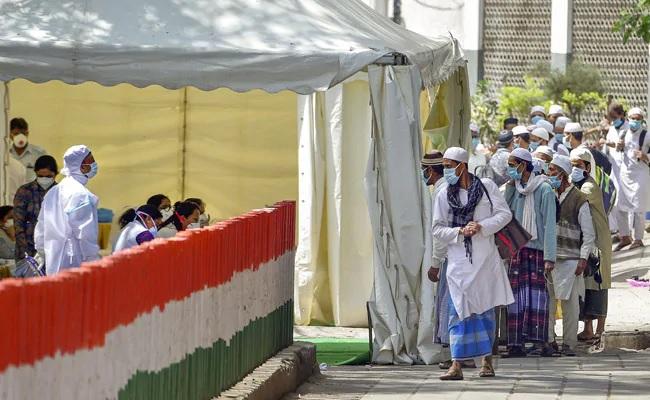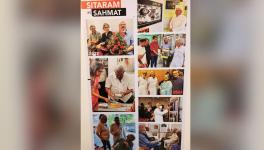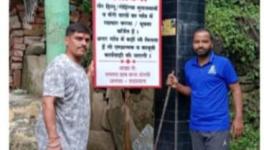Politics, Police and Media in Tablighi Jamaat Episode

Image Courtesy: NDTV
The Covid-19 epidemic is spreading at an alarming pace in India. In most parts of the country, the suffering caused by it is immense. The World Health Organisation had warned governments in early February of the impending danger of the Novel Coronavirus, which causes the Covid-19 disease, but the Indian government was busy organising “Namaste Trump” at the time. After making a big show of welcoming United States President Donald Trump to India, the ruling Bharatiya Janata Party got busy with the so-called Operation Kamal to overthrow the Congress government in Madhya Pradesh. For these reasons, the Centre started preparing to tackle the pandemic after a great deal of delay.
In fact it is only after the “janata curfew” was declared on 22 March, and a total lockdown on 24 March, that the issue started being taken up in real earnest by the Centre. Precious time was lost by then, but to shirk from its responsibility, the Indian state found a convenient target: the Tabligi Jamaat (TJ). The TJ held a three-day seminar from 13 March to 15 March at its markaz or headquarters in the Nizamuddin area of Delhi. The media picked up the narrative that this meeting was the reason for the Covid-19 pandemic spreading in India from the government. Sure, there was a lapse of judgement by the organisers of the TJ seminar. Its timing was surely inappropriate, for an assembly of thousands of people should not have taken place while a pandemic loomed. Still, what is ignored by TJ’s critics is that there was no lockdown when it was planned or organised, and nothing prevented people from coming to the markaz, from India or abroad.
Besides, many more people attended the Namaste Trump fanfare. Nearly two lakh people attended this series of events, which took place over February 24 and 25. Not just political events, even temples and maths were congregating as usual at the time of the TJ event, and even after it. Attendees had come to the TJ headquarters from all over the world, and they had been given permission by the government to congregate. Each arrival from overseas was screened at airports just like all others at the time. When the lockdown was announced, the TJ officials clarified, they tried to vacate the markaz, but got little support from the authorities to do so. And while all this happened, the blame for spreading Covid-19 was placed solely on them. This series of events exemplifies the mindset and political manoeuvring around the TJ event. Demonising the TJ became a convenient ploy to target the entire Muslim community. And it is not just a few commentators saying so—the Bombay High Court’s Aurangabad Bench has now ruled that the actions taken against the Tablighis were an attempt to find a scapegoat for the viral pandemic.
The communal media went hysterical in March, proclaiming that the Tablighis were deliberately spreading Covid-29 as part of a preconceived plan. They called it, crudely, “corona jihad” and accused Muslims of having prepared a “corona bomb” at the markaz. The even more strange aspect of this matter is that the markaz is hardly a stone’s throw from the Nizamuddin police station, whose officials the TJ administration had been in touch with regularly. According to TJ officials, the sudden announcement of the lockdown meant that its members were unable to travel out of Nizamuddin, and so they were stranded there.
Even more astounding is how quickly the negative portrayal of the TJ by the mainstream media, especially TV channels, spread far and wide. The idea that Muslims were spreading Covid-19 deliberately became a part of the common social understanding. The impact on India’s social life was instant and negative. At places, Muslim truck drivers had to run away from fear of mob violence. Muslim vegetable vendors were beaten up at some places and many housing colonies refused to allow them to enter. There were attacks on Muslims in rural areas and many hospitals also allegedly declined to give Muslims care.
After some TJ members were quarantined or admitted to hospitals, the makers of fake news went into overdrive. Rumours started doing the rounds that its members were directing obscene gestures at nurses, or that they are spitting at officials, or undressing in the hospital wards, and so on. All this provided enough grist to India’s Islamophobia mill, which seems always to be churning these days. The police promptly filed cases against TJ members, those who had come from abroad especially. Cases were filed under various clauses related to violation of visa rules, spreading an epidemic, and also preaching Islam.
In a couple of recent judgments on the issue, the role of media and police have come under scathing criticism. The blatant falsehoods included in the FIRs and the propaganda by a section of the media now stand exposed. In its judgement, the Aurangabad Bench of the Bombay High Court has observes, “A political government tries to find a scapegoat when there is pandemic or calamity and the circumstances show that there is a probability that these foreigners were chosen to make them scapegoats. The aforesaid circumstances and the latest figures of infection in India show that such action against present petitioners should not have been taken.” Critiquing the media, the court observes, “There was big propaganda in print media and electronic media against the foreigners who had come to Markaz Delhi and an attempt was made to create a picture that these foreigners were responsible for spreading Covid-19 in India. There was virtually persecution against these foreigners.”
The judgment should become a case study of the attitude of the state, particularly its policing arm, and the media, towards religious minorities. Muslims who arrive in India from aboard for seminars or to tour the country were harassed to no end in the early part of this year. The court also states, “This action indirectly gave warning to Indian Muslims that action in any form and for anything can be taken against Muslims. It was indicated that even for keeping contact with Muslims of other countries, action will be taken against them. Thus, there is a smell of malice in the actions taken against these foreigners and Muslims for their alleged activities.”
Incidentally, the Covid-19 pandemic has shown us that those who are responsible to inform the public are totally biased and look for targets among the Muslims. Conversely, the events of March and April demonstrate how some sections of society are treated like holy cows. For instance, many who have been arrested in the cases related to the violence in Delhi in lateFebruary, had been actively protesting against the government’s CAA-NRC project. Those who delivered provocative speeches, such as the ruling party’s Members of Parliament Anurag Thakur, Parvesh Varma, and BJP leader Kapil Mishra, are free to go about their business while those who supported peaceful protests are under the scanner.
A similar attitude was observed in the series of bomb blasts which shook the country between 2006 and 2008. Just a couple of examples will suffice to illustrate this point. In the aftermath of Mecca Masjid blast in Hyderabad, which occurred in May 2007, scores of young men, mostly Muslims, were arrested right away. They were released, as in many other such cases, by the courts due to lack of credible evidence of their involvement in them. In the Malegaon blast case, the accused Pragya Thakur, is out on bail and has become a lawmaker. The lesson we learn from this is that some people are targeted for their religious identity and others are exonerated, for the same reason. In a way, in the TJ case, this is what the recent court rulings point to.
The author is a social activist and commentator. The views are personal.
Get the latest reports & analysis with people's perspective on Protests, movements & deep analytical videos, discussions of the current affairs in your Telegram app. Subscribe to NewsClick's Telegram channel & get Real-Time updates on stories, as they get published on our website.
























